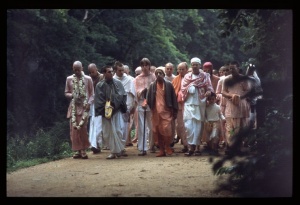SB 1.19.11: Difference between revisions
m (1 revision(s)) |
(Vanibot #0054 edit - transform synonyms into clickable links, which search similar occurrences) |
||
| (One intermediate revision by one other user not shown) | |||
| Line 1: | Line 1: | ||
{{info | {{info | ||
|speaker= | |speaker=Sūta Gosvāmī | ||
|listener=Sages of | |listener=Sages of Naimiṣāraṇya | ||
}} | }} | ||
[[Category:Srimad-Bhagavatam - Canto 01 Chapter 19]] | |||
[[Category:Bhagavatam Verses Spoken by Suta Gosvami - Vanisource|011911]] | |||
<div style="float:left">'''[[Srimad-Bhagavatam]] - [[SB 1|First Canto]] - [[SB 1.19: The Appearance of Sukadeva Gosvami|Chapter 19: The Appearance of Śukadeva Gosvāmī]]'''</div> | |||
<div style="float:right">[[File:Go-previous.png|link=SB 1.19.9-10]] '''[[SB 1.19.9-10]] - [[SB 1.19.12]]''' [[File:Go-next.png|link=SB 1.19.12]]</div> | |||
{{CompareVersions|SB|1.19.11|SB 1965|SB 1972-77}} | |||
{{RandomImage}} | |||
==== TEXT 11 ==== | ==== TEXT 11 ==== | ||
<div class="verse"> | |||
<div | :anye ca devarṣi-brahmarṣi-varyā | ||
anye ca devarṣi-brahmarṣi-varyā | :rājarṣi-varyā aruṇādayaś ca | ||
rājarṣi-varyā aruṇādayaś ca | :nānārṣeya-pravarān sametān | ||
nānārṣeya-pravarān sametān | :abhyarcya rājā śirasā vavande | ||
abhyarcya rājā śirasā vavande | |||
</div> | </div> | ||
| Line 18: | Line 23: | ||
==== SYNONYMS ==== | ==== SYNONYMS ==== | ||
<div class="synonyms"> | |||
<div | ''[//vanipedia.org/wiki/Special:VaniSearch?s=anye&tab=syno_o&ds=1 anye]'' — many others; ''[//vanipedia.org/wiki/Special:VaniSearch?s=ca&tab=syno_o&ds=1 ca]'' — also; ''[//vanipedia.org/wiki/Special:VaniSearch?s=devarṣi&tab=syno_o&ds=1 devarṣi]'' — saintly demigods; ''[//vanipedia.org/wiki/Special:VaniSearch?s=brahmarṣi&tab=syno_o&ds=1 brahmarṣi]'' — saintly ''brāhmaṇas''; ''[//vanipedia.org/wiki/Special:VaniSearch?s=varyāḥ&tab=syno_o&ds=1 varyāḥ]'' — topmost; ''[//vanipedia.org/wiki/Special:VaniSearch?s=rājarṣi&tab=syno_o&ds=1 rājarṣi]-[//vanipedia.org/wiki/Special:VaniSearch?s=varyāḥ&tab=syno_o&ds=1 varyāḥ]'' — topmost saintly kings; ''[//vanipedia.org/wiki/Special:VaniSearch?s=aruṇa&tab=syno_o&ds=1 aruṇa]-[//vanipedia.org/wiki/Special:VaniSearch?s=ādayaḥ&tab=syno_o&ds=1 ādayaḥ]'' — a special rank of ''rājarṣis''; ''[//vanipedia.org/wiki/Special:VaniSearch?s=ca&tab=syno_o&ds=1 ca]'' — and; ''[//vanipedia.org/wiki/Special:VaniSearch?s=nānā&tab=syno_o&ds=1 nānā]'' — many others; ''[//vanipedia.org/wiki/Special:VaniSearch?s=ārṣeya&tab=syno_o&ds=1 ārṣeya]-[//vanipedia.org/wiki/Special:VaniSearch?s=pravarān&tab=syno_o&ds=1 pravarān]'' — chief amongst the dynasties of the sages; ''[//vanipedia.org/wiki/Special:VaniSearch?s=sametān&tab=syno_o&ds=1 sametān]'' — assembled together; ''[//vanipedia.org/wiki/Special:VaniSearch?s=abhyarcya&tab=syno_o&ds=1 abhyarcya]'' — by worshiping; ''[//vanipedia.org/wiki/Special:VaniSearch?s=rājā&tab=syno_o&ds=1 rājā]'' — the Emperor; ''[//vanipedia.org/wiki/Special:VaniSearch?s=śirasā&tab=syno_o&ds=1 śirasā]'' — bowed his head to the ground; ''[//vanipedia.org/wiki/Special:VaniSearch?s=vavande&tab=syno_o&ds=1 vavande]'' — welcomed. | ||
</div> | </div> | ||
| Line 26: | Line 30: | ||
==== TRANSLATION ==== | ==== TRANSLATION ==== | ||
<div class="translation"> | |||
<div | |||
There were also many other saintly demigods, kings and special royal orders called aruṇādayas [a special rank of rājarṣis] from different dynasties of sages. When they all assembled together to meet the Emperor [Parīkṣit], he received them properly and bowed his head to the ground. | There were also many other saintly demigods, kings and special royal orders called aruṇādayas [a special rank of rājarṣis] from different dynasties of sages. When they all assembled together to meet the Emperor [Parīkṣit], he received them properly and bowed his head to the ground. | ||
</div> | </div> | ||
| Line 34: | Line 37: | ||
==== PURPORT ==== | ==== PURPORT ==== | ||
<div class="purport"> | |||
The system of bowing the head to the ground to show respect to superiors is an excellent etiquette which obliges the honored guest deep into the heart. Even the first-grade offender is excused simply by this process, and Mahārāja Parīkṣit, although honored by all the ''ṛṣis'' and kings, welcomed all the big men in that humble etiquette in order to be excused from any offenses. Generally at the last stage of one's life this humble method is adopted by every sensible man in order to be excused before departure. In this way Mahārāja Parīkṣit implored everyone's good will for going back home, back to Godhead. | |||
</div> | |||
<div | |||
<div style="float:right; clear:both;">[[File:Go-previous.png|link=SB 1.19.9-10]] '''[[SB 1.19.9-10]] - [[SB 1.19.12]]''' [[File:Go-next.png|link=SB 1.19.12]]</div> | |||
</div> | __NOTOC__ | ||
__NOTOC__ | __NOEDITSECTION__ | ||
Latest revision as of 18:05, 17 February 2024

A.C. Bhaktivedanta Swami Prabhupada
TEXT 11
- anye ca devarṣi-brahmarṣi-varyā
- rājarṣi-varyā aruṇādayaś ca
- nānārṣeya-pravarān sametān
- abhyarcya rājā śirasā vavande
SYNONYMS
anye — many others; ca — also; devarṣi — saintly demigods; brahmarṣi — saintly brāhmaṇas; varyāḥ — topmost; rājarṣi-varyāḥ — topmost saintly kings; aruṇa-ādayaḥ — a special rank of rājarṣis; ca — and; nānā — many others; ārṣeya-pravarān — chief amongst the dynasties of the sages; sametān — assembled together; abhyarcya — by worshiping; rājā — the Emperor; śirasā — bowed his head to the ground; vavande — welcomed.
TRANSLATION
There were also many other saintly demigods, kings and special royal orders called aruṇādayas [a special rank of rājarṣis] from different dynasties of sages. When they all assembled together to meet the Emperor [Parīkṣit], he received them properly and bowed his head to the ground.
PURPORT
The system of bowing the head to the ground to show respect to superiors is an excellent etiquette which obliges the honored guest deep into the heart. Even the first-grade offender is excused simply by this process, and Mahārāja Parīkṣit, although honored by all the ṛṣis and kings, welcomed all the big men in that humble etiquette in order to be excused from any offenses. Generally at the last stage of one's life this humble method is adopted by every sensible man in order to be excused before departure. In this way Mahārāja Parīkṣit implored everyone's good will for going back home, back to Godhead.